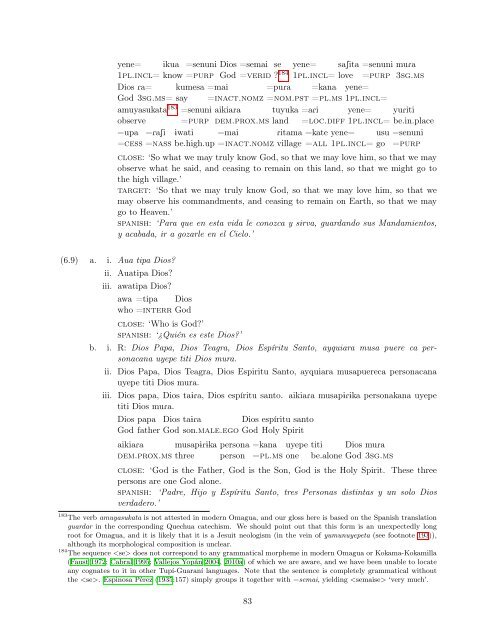draft manuscript - Linguistics - University of California, Berkeley
draft manuscript - Linguistics - University of California, Berkeley
draft manuscript - Linguistics - University of California, Berkeley
You also want an ePaper? Increase the reach of your titles
YUMPU automatically turns print PDFs into web optimized ePapers that Google loves.
yene= ikua =senuni Dios =semai se yene= saSita =senuni muRa<br />
1pl.incl= know =purp God =verid ? 184 1pl.incl= love =purp 3sg.ms<br />
Dios Ra= kumesa =mai =puRa =kana yene=<br />
God 3sg.ms= say =inact.nomz =nom.pst =pl.ms 1pl.incl=<br />
amuyasukata 183 =senuni aikiaRa tuyuka =aRi yene= yuRiti<br />
observe =purp dem.prox.ms land =loc.diff 1pl.incl= be.in.place<br />
=upa =RaSi 1wati =mai Ritama =kate yene= usu =senuni<br />
=cess =nass be.high.up =inact.nomz village =all 1pl.incl= go =purp<br />
close: ‘So what we may truly know God, so that we may love him, so that we may<br />
observe what he said, and ceasing to remain on this land, so that we might go to<br />
the high village.’<br />
target: ‘So that we may truly know God, so that we may love him, so that we<br />
may observe his commandments, and ceasing to remain on Earth, so that we may<br />
go to Heaven.’<br />
spanish: ‘Para que en esta vida le conozca y sirva, guardando sus Mandamientos,<br />
y acabada, ir a gozarle en el Cielo.’<br />
(6.9) a. i. Aua tipa Dios?<br />
ii. Auatipa Dios?<br />
iii. awatipa Dios?<br />
awa =tipa Dios<br />
who =interr God<br />
close: ‘Who is God?’<br />
spanish: ‘¿Quién es este Dios?’<br />
b. i. R: Dios Papa, Dios Teagra, Dios Espíritu Santo, ayquiara musa puere ca personacana<br />
uyepe titi Dios mura.<br />
ii. Dios Papa, Dios Teagra, Dios Espiritu Santo, ayquiara musapuereca personacana<br />
uyepe titi Dios mura.<br />
iii. Dios papa, Dios ta1Ra, Dios espíritu santo. aikiaRa musap1R1ka personakana uyepe<br />
titi Dios muRa.<br />
Dios papa Dios ta1Ra Dios espíritu santo<br />
God father God son.male.ego God Holy Spirit<br />
aikiaRa musap1R1ka persona =kana uyepe titi Dios muRa<br />
dem.prox.ms three person =pl.ms one be.alone God 3sg.ms<br />
close: ‘God is the Father, God is the Son, God is the Holy Spirit. These three<br />
persons are one God alone.<br />
spanish: ‘Padre, Hijo y Espíritu Santo, tres Personas distintas y un solo Dios<br />
verdadero.’<br />
183 The verb amuyasukata is not attested in modern Omagua, and our gloss here is based on the Spanish translation<br />
guardar in the corresponding Quechua catechism. We should point out that this form is an unexpectedly long<br />
root for Omagua, and it is likely that it is a Jesuit neologism (in the vein <strong>of</strong> yumunuyepeta (see footnote 193)),<br />
although its morphological composition is unclear.<br />
184 The sequence does not correspond to any grammatical morpheme in modern Omagua or Kokama-Kokamilla<br />
(Faust 1972; Cabral 1995; Vallejos Yopán 2004, 2010a) <strong>of</strong> which we are aware, and we have been unable to locate<br />
any cognates to it in other Tupí-Guaraní languages. Note that the sentence is completely grammatical without<br />
the . Espinosa Pérez (1935:157) simply groups it together with =semai, yielding ‘very much’.<br />
83
















